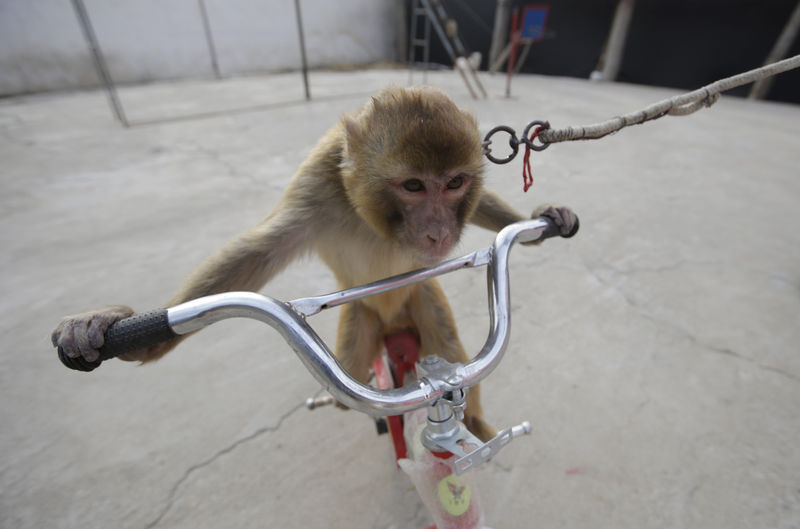By Joseph Campbell
BAOWAN VILLAGE, China (Reuters) - During decades of political turmoil in China under Mao Zedong, monkeys were not trained or kept as pets, but often eaten.
But one village in rural Henan province, where the land is too hard and rough to grow crops, residents have for centuries relied on training performing monkeys to make money. And as the Year of the Monkey approaches, they are hoping for bumper business.
A small temple devoted to the deity of the Monkey King, a popular figure from Chinese folklore and literature, sits on the outskirts of Baowan.
"Since this will be the Year of the Monkey, and we will be putting on (monkey performance) competitions for tourists, we all need to visit this temple and burn some incense,” Zhang Zhijiu, a 60-year-old former monkey busker, said after praying.
Monkey breeding and raising is illegal across China without a proper licence, but the 2,500 villagers of Baowan are an exception.
The animals, some wearing tight metal collars, are taught to ride bicycles and walk on stilts. One trainer was throwing daggers at a monkey balanced on a wooden board on a rolling cylinder.
The animal was deftly catching the daggers and putting them between its teeth.
Fan Haoran, 57, a trainer at Qilingang Monkey Farm who travelled the country monkey busking for decades, has been training monkeys since his youth. He says the key is to develop a relationship.
"Firstly, you have to show concern and take care of them. Secondly, you must proceed slowly, little by little, and not rush. For instance, when shaking hands - from the beginning, little by little - and then it will remember your hand."
But for China, which has spent decades trying to end rural poverty, animal rights have been almost non-existent until recently, and then mostly among urban pet owners.
Zhang Junran, president of Xinye County’s monkey breeding association, admitted that Baowan’s treatment of monkeys has been controversial, but he said the current methods were humane.
"Our way of training monkeys to perform was not the most educated (in the past). Especially when it came to their living conditions... But these monkeys also have lives, and they have brought us so many benefits, which have made such major changes to our lives. We must be good to our monkeys,” said Zhang.
Zhang Zhijie, 57, keeps a four year-old macaque tied on a leash just outside his home. Zhang comes from a line of monkey trainers and has made a small fortune performing across the country.
"It started from my grandfather, then my father, and then it was passed down to me. My kids studied in primary school, and then went college. Their education was completely paid for by money made from our monkey performances,” he said.

But the family business may be coming to an end - his children are not showing the same interest in the family tradition.